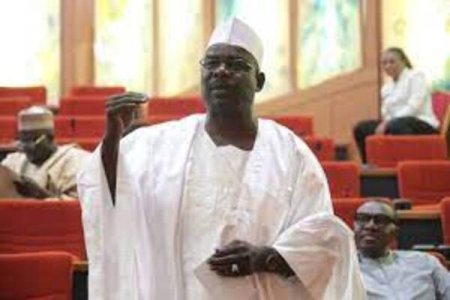
Senator Ali Ndume criticizes Nigerian government's proposed 5% "cybersecurity levy" tax on telecom data and internet usage. Calls it unfair burden on citizens amid economic struggles. Tax aimed at funding cybercrime efforts, but Ndume says misplaced priority over uplifting the poor. Labor unions also oppose new levy.
A senior Nigerian lawmaker has fired a broadside at the government over plans to impose a new 5% tax on telecommunications services and internet data, slamming it as an unfair financial burden on citizens already struggling economically.
Senator Ali Ndume, who represents Borno South in the National Assembly, criticized the proposed "cybersecurity levy" championed by President Bola Tinubu's administration as ill-timed and potentially disastrous for millions of Nigerians. "You cannot keep loading new taxes on people when you are not increasing their income sources," Ndume said during a television interview. "I am not part of those that support levying people anyhow."
The Tinubu government argues the 5% consumer tax on telecom data is needed to fund enhanced cybersecurity capabilities and combat online crimes like scams and hacking threats. But Ndume pushed back forcefully, asserting Nigeria faces more pressing priorities.
"We have failed to properly fund education, healthcare and infrastructure development for the masses," the senator stated. "Preying further upon the pockets of suffering Nigerians with this levy while our housekeeping is in disarray is putting the cart before the horse."
As a former Senate leader and current chair of the army committee, Ndume's criticism represents a rare public break from the ruling party over a major policy. It significantly raises doubts over whether the cybersecurity tax can secure legislative approval in its current proposed form.
While supporting recent updates to Nigeria's cybercrime laws, Ndume expressed regret for not scrutinizing a provision that opened the door to financially burdening citizens with a new levy he claims to have been unaware of initially. "If I had known there is an issue where a cost would be transferred to a customer or a Nigerian, I would not agree," he said.
The proposed 5% tax on telecom data services would be paid by consumers on top of existing fees. It is estimated to generate over $400 million annually, according to government projections. But Ndume argues those funds could be better allocated from the federal budget rather than squeezing already-strained Nigerians grappling with soaring prices, poverty and economic hardship. "The priority must be uplifting the common Nigerian from poverty, not adding new financial hardships," he insisted.
Nigeria's organized labor has also threatened nationwide protests if the cybersecurity levy is not rescinded, decrying it as an excessive money grab by the government at the expense of citizens. The House of Representatives has called on financial regulators to withdraw implementation of the new tax.
As backlash mounts, the controversial levy has emerged as an early test for Tinubu's two-month-old presidency and its economic policy agenda.




